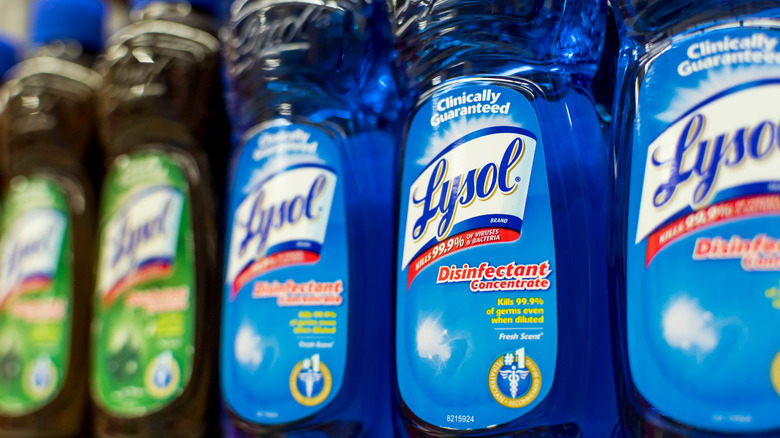Lysol's Dark History Might Surprise You
Lysol has been around for decades, and it is known for its ability to kill germs on most household surfaces. But the product has a dark history that may surprise you, and it has to do with feminine hygiene. That's right, feminine hygiene. At one point in the 1930s and through to the 1960s, Lysol targeted women with advertisements promoting the product as a douche. The cleaner even became a top-selling item for feminine hygiene during that time, according to Case Western Reserve University.
Vintage ads seen across the internet show how advertisements encouraged women to kill germs "gently" and "thoroughly" by douching with Lysol. These advertisements represent women shunned by their husbands with the promise of a refreshing douche with Lysol as the solution. In addition, this practice was apparently prescribed by esteemed doctors. One ad seemingly blamed a woman for being "neglectful" in the feminine hygiene department, pointing out that her doctor had to "straighten her out" by recommending to "always" douche with Lysol (via HuffPost).
Lysol may have been used as birth control
If that's not bad enough, some believe that Lysol was covertly pushed as birth control. Part of this reasoning stems from the fact that effective forms of birth control were limited until the invention of the pill in 1960. A common misconception was that douching, especially antiseptic douching, after intercourse would kill sperm. Lysol wasn't the only product advertised for feminine hygiene, but it may have been the only household cleaner promoted as such, as noted by HuffPost.
Unsurprisingly, women were hurt from douching with Lysol, and eventually, Lysol manufacturer Lehn & Fink found themselves hit with lawsuits claiming their product caused burns and bleeding. Some doctors even reported Lysol-related deaths, five of which stemmed from "uterine irrigation." Furthermore, an investigation by the American Medical Association found that the benefits of Lysol for feminine hygiene that doctors touted did not exist (via Medicine Net).
Thankfully, Lysol has shifted its focus from personal hygiene to helping people across the world keep household surfaces clean.

